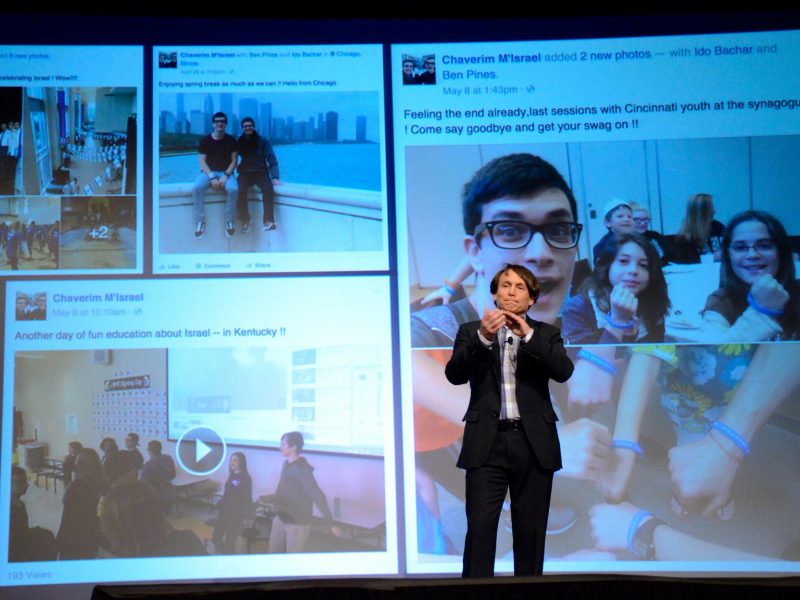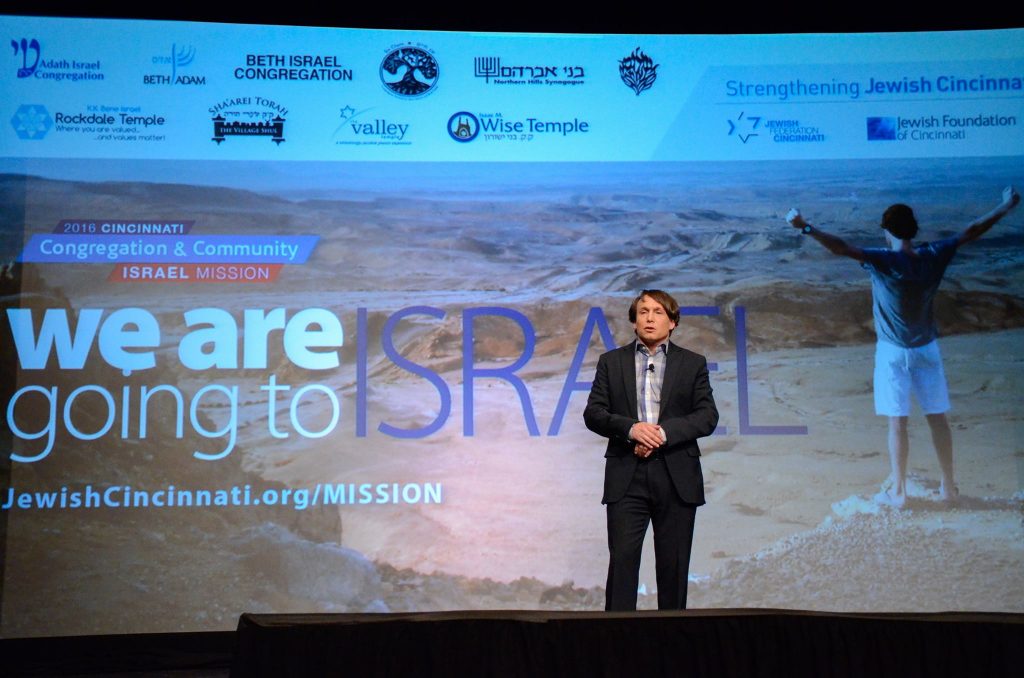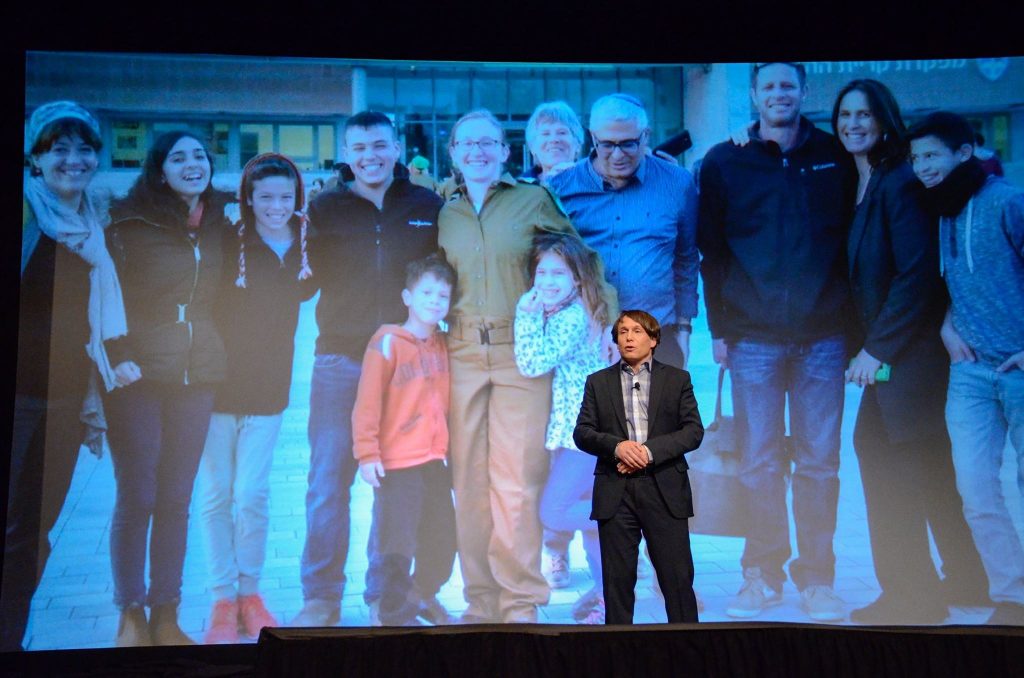Danielle V. Minson — Raising the Bar

Can We Build a Big Tent for Israel Despite Intensifying Partisanship?
I was so moved by the standing-room only attendance at this year’s JFC Annual Meeting. The next day I bumped into a few people who asked if I could send them the remarks that I offered about how the challenges of supporting Israel became more difficult this past year and how Cincinnati innovated in response. It was gratifying that people found those remarks meaningful and important. So I also wanted to share them here. —Shep
It may not surprise you that when I was fifteen, Sunday school was not the highlight of my week. But my ninth grade teacher changed that. He was fresh from service as a pilot in the Israel Defense Forces (IDF). He was handsome, confident, and proud, and I wanted to be like him.
Each of us has our own Israel story and our own relationship with Israel, even if we have never been there. Israel’s stunning accomplishments and endless political problems loom so large for us, that we cannot fully separate our personal identity as Jews from our relationship with Israel.
Since 1948, supporting Israel has been a top priority for our Jewish Federation and every Jewish Federation. The Federation system raised billions of dollars to pay the bulk of the cost of resettling nearly 3 million Jews—from Holocaust survivors to the Jews of Ethiopia. This “in-gathering” to Israel has been so successful that soon, 90 percent of the world’s Jews will live either in North America or in Israel, with Israel’s half getting larger.
What does this mean for us? It means we face this challenge: how can we build one Jewish future for a Jewish people living in two very different lands? In my 20-plus years working in the Jewish community, I never expected this challenge to get so steep as it has this past year. This past year, Israel has been used and abused as a partisan political football—putting our support for Israel painfully in tension with our personal politics. This past year, the rants of anti-Israel activists have gotten fouler. And saddest of all, this past year, a small group of Israeli officials have spewed disrespect on non-Orthodox Judaism.
This divisiveness that has drenched Israel issues makes us question whether and how our relationship with Israel should change. In fact, some Jewish organizations, fearing controversy, are quietly taking Israel out of their programs and dialogues.
But in Cincinnati, we are taking the opposite approach. Our Federation, our Jewish Community Relations Council, our Mayerson JCC, and our diverse rabbis all agree. We agree that as our relationship with Israel has become more difficult, we need—not less—but more creative ways to engage with each other and with Israelis. Why? Because the risk of not having the open dialogue is even greater. The long-term risk is drift—drift that could mean that our grandchildren may not recognize Israelis as part of the same Jewish people.
Cincinnati is fostering this open dialogue and engagement in three ways. First, in January, we hosted our Cincinnati 2020 Israel Summit. More than 150 of our community leaders, rabbis, board officers, and educators participated. They shared their personal “Israel stories,” their views, their concerns, and their hopes for Israel. It was a safe space to understand Israel differently. It was safe to disagree with policies or actions of the Israeli government, and to still stand with the Israeli people.
Second, we kicked off the third year of the Israelity Speaker Series. Expertly crafted by our creative and inspiring shlicha, or community emissary from Israel, Maia Morag, in collaboration with our Jewish Community Relations Council (JCRC) and the Mayerson JCC, Israelity is not about political debate. It’s a uniquely smart behind-the-scenes journey through the fascinating and maddening realities of today’s Israeli society.
Third, this summer, our community will engage with Israel in Israel. We will break all records as 508 Cincinnatians experience Israel through the eyes of their rabbis.
 The 2016 Cincinnati Congregation and Community Israel Mission is the largest Israel Mission from a community of our size in fifty years. Even more impressive is its uniqueness on a national level, with the participation of ten Cincinnati congregations, including Humanist, Reform, Conservative, and Orthodox. This was possible only because our Federation, The Jewish Foundation, and our rabbis collaborated, and we agree on a vision that includes the transformative power of Israel experiences and the essential value of congregations.
The 2016 Cincinnati Congregation and Community Israel Mission is the largest Israel Mission from a community of our size in fifty years. Even more impressive is its uniqueness on a national level, with the participation of ten Cincinnati congregations, including Humanist, Reform, Conservative, and Orthodox. This was possible only because our Federation, The Jewish Foundation, and our rabbis collaborated, and we agree on a vision that includes the transformative power of Israel experiences and the essential value of congregations.
As we face increasingly bitter, closed-minded attacks on Israel, engaging internally must be matched with equal attention outside the Jewish community. We are fortunate that our Jewish Community Relations Council (JCRC) is expert at building strong bridges and alliances with civic, political, business, and religious leaders across our region. On college campuses, anti-Israel political attacks have gotten nastier—often blurring the lines between anti-Israel smear and antisemitism. Our JCRC is educating and supporting students who are entering college, in an effort to prepare them and help them find their voice in the Israel conversation. Our 18-year-old Israeli emissaries (we call them chaverim) are also a precious resource in this effort. They go to Jewish schools, public schools, Catholic schools, urban schools, and rural schools. They go to schools where many students have never met a Jew, never mind an Israeli. They provide a human Israeli face—and they make it fun. This year alone, they connected with more than 5,000 people in our Cincinnati community.
In closing, let me share that I would not be standing here talking to you—I would not have made my career in the Jewish community—but for the life-changing Israel experience I had when I was 17 with my congregation and my rabbi. During that trip, I became close to the other branch of my family. When my grandmother was 14, as the oldest of 9, she was chosen to come to America with an aunt and uncle.
Years later, her youngest brother left for Israel as a pioneer to help build the Jewish State when he was 16. All of their other brothers and sisters were murdered at Auschwitz.
 A few years ago, when my daughter, Lila, spent half of 11th grade studying at the Alexander Muss High School in Israel, she grew close to our Israeli cousins of her generation. She also visited Auschwitz as part of her program. She decided that if her cousins were serving in the IDF to ensure that Jews will never again be left at the mercy of others, why shouldn’t she serve with them? Lila was only able to do this because of the Jewish education and Hebrew language skills she received at Yavneh/Rockwern, and because of a Cincy Journeys grant that enabled Lila to study in Israel during high school.
A few years ago, when my daughter, Lila, spent half of 11th grade studying at the Alexander Muss High School in Israel, she grew close to our Israeli cousins of her generation. She also visited Auschwitz as part of her program. She decided that if her cousins were serving in the IDF to ensure that Jews will never again be left at the mercy of others, why shouldn’t she serve with them? Lila was only able to do this because of the Jewish education and Hebrew language skills she received at Yavneh/Rockwern, and because of a Cincy Journeys grant that enabled Lila to study in Israel during high school.
What’s amazing is that in Cincinnati, stories like Lila’s are not uncommon. Cincinnati has produced many who have lived in Israel, or studied to become rabbis, Jewish educators, and Jewish leaders. This is no accident. It’s because this community was one of the first to understand that there is no more powerful way to build Jewish identity and Jewish pride than through experience and engagement with Israel.

